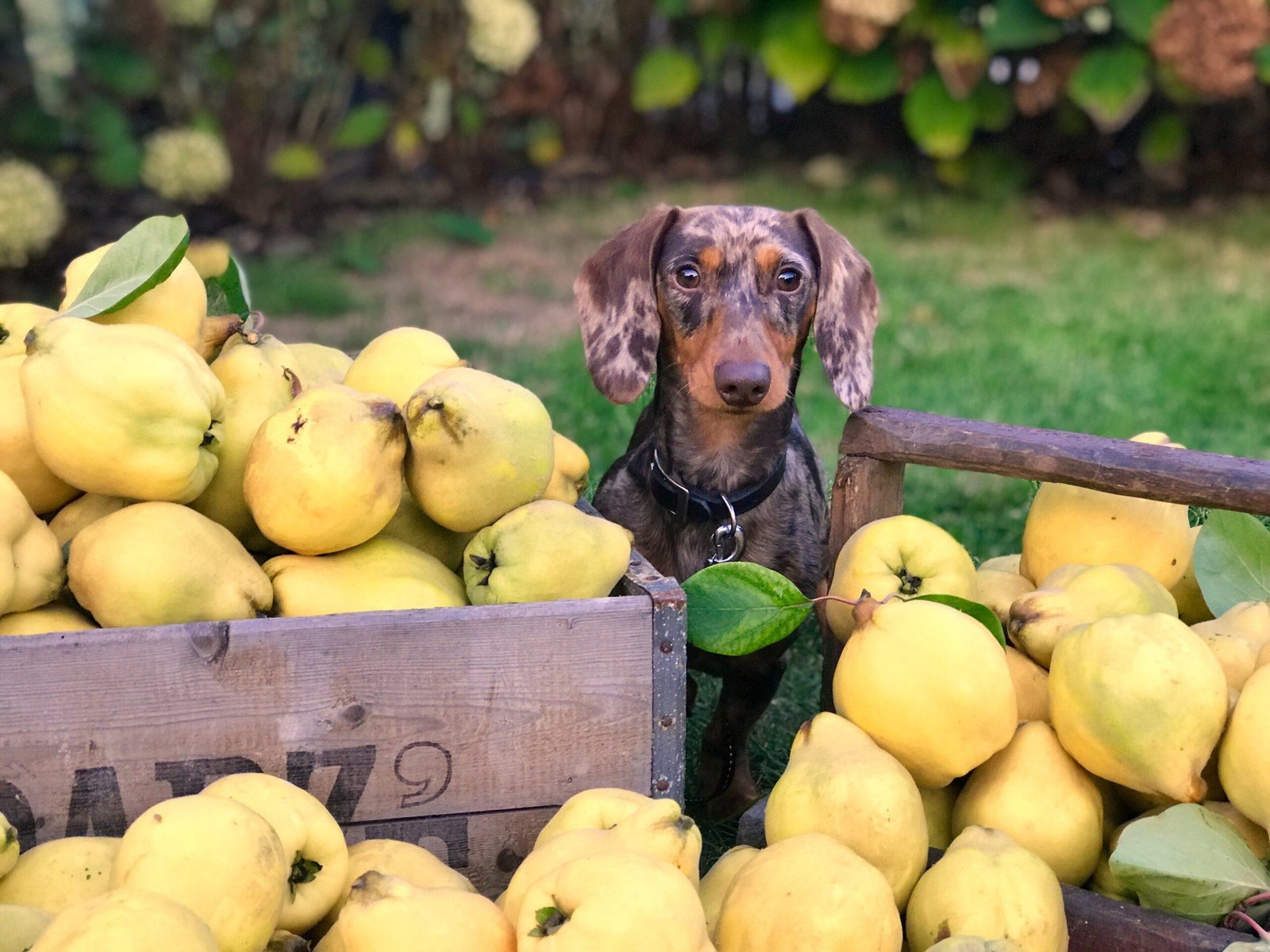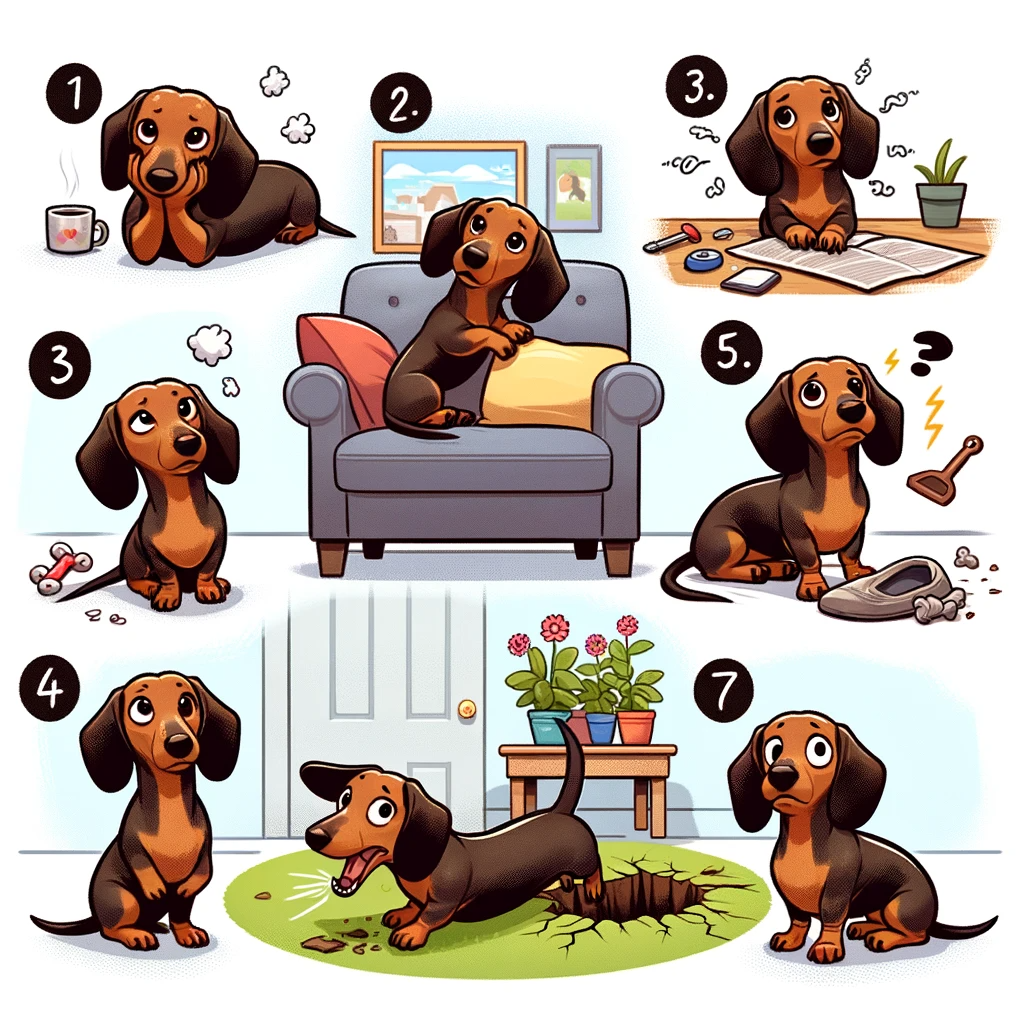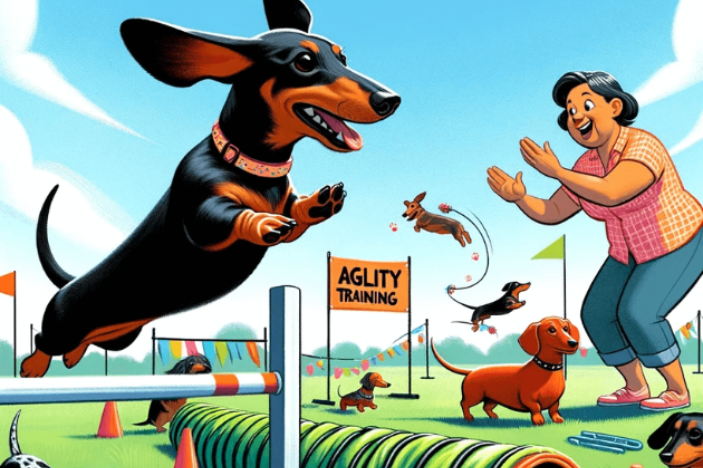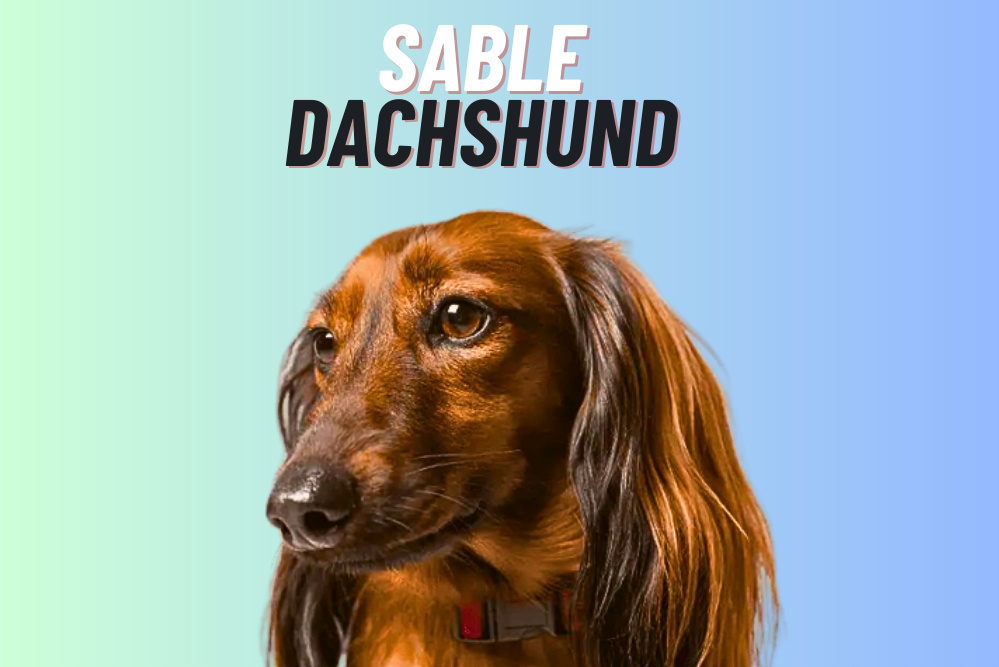Dachshund Obsessed with Food
Are you worried that your dachshund is addicted to food? Do you think he’s going to end up overweight and unhealthy? Well, you’re not alone. In fact, many dachshund dog owners worry about their dogs being obsessed with food.
Dachshunds are known to have a strong appetite and can be quite food-oriented. They are notorious for their love of food and may exhibit behaviors that seem like an obsession with food. It’s important to manage their diet and provide them with appropriate portions to maintain their health and prevent obesity.
Regular exercise and mental stimulation are also important for keeping your dachshund happy and healthy. If you have concerns about your dachshund’s behavior or eating habits, it’s always a good idea to consult with a veterinarian for advice tailored to your specific situation.
Why Dachshunds are Obsessed with Food?
Dachshunds, like many other dog breeds, can exhibit a strong obsession with food. Several factors contribute to this behavior:
Genetic Predisposition
Dachshunds were originally bred as hunting dogs, specifically for tracking and retrieving games. Their natural instincts drive them to scavenge for food whenever it’s available. This genetic predisposition can make them highly focused on food.
Food-Oriented Nature
Some individual Dachshunds simply have a higher food drive and a greater interest in food compared to other breeds. They may have a strong appetite and be more motivated by treats and food rewards.
Overfeeding or Improper Diet
If a Dachshund has been consistently overfed or given an imbalanced or inadequate diet, it can contribute to its obsession with food. Improper nutrition can leave them feeling unsatisfied and constantly craving more food.
Lack of Stimulation
Dachshunds are intelligent and active dogs that require regular mental and physical stimulation. If they do not receive enough mental and physical exercise, they may turn to food as a way to alleviate boredom or seek entertainment.
Begging Behavior Reinforcement
Dachshunds are smart and quick learners. If they have been rewarded in the past for begging or showing food-seeking behaviors, such as receiving table scraps or extra treats, it can reinforce their fixation on food. This can lead to a cycle of persistent begging and food obsession.
It’s important to note that while these factors contribute to a Dachshund’s food obsession, each dog is an individual, and the extent of their obsession may vary.
Proper management, including portion control, a balanced diet, mental and physical stimulation, and avoidance of reinforcing begging behaviors, can help address and manage a Dachshund’s obsession with food. Consulting with a veterinarian or professional dog trainer can provide further guidance and support tailored to your specific Dachshund needs.
Managing a Dachshund’s food obsession
Managing a Dachshund’s food obsession requires a combination of strategies to promote a healthier relationship with food.
Here are some effective approaches
Establish a Consistent Feeding Schedule
Set regular meal times for your Dachshund and stick to them. Avoid leaving food out all day, as this can encourage grazing and overeating. By providing meals at specific times, your Dachshund will learn that food is not always available, reducing their fixation on it.
Portion Control
Work with your veterinarian to determine the appropriate portion sizes for your Dachshund based on their age, weight, and activity level. Measuring meals accurately helps prevent overeating and weight gain. Avoid the temptation to overfeed or give in to their begging behavior.
Slow Feeding Methods
Dachshunds tend to eat quickly, which can contribute to overeating. Consider using slow-feeding bowls or puzzle toys that require your Dachshund to work for their food. These tools slow down their eating pace, provide mental stimulation, and prevent them from consuming large amounts of food rapidly.
Provide Mental and Physical Stimulation
Engage your Dachshund in regular exercise and mentally stimulating activities. Take them for walks, play interactive games, and provide puzzle toys that challenge their problem-solving skills. By redirecting their focus and energy toward other activities, you can decrease their fixation on food.
Avoid Reinforcing Begging Behaviors
Do not give in to begging or food-seeking behaviors from your Dachshund. Reinforcing these behaviors only encourages their obsession with food. Instead, reward them with praise, attention, or non-food items such as toys or playtime. Consistency is key to breaking the cycle of begging.
Maintain a Balanced Diet
Ensure your Dachshund is on a nutritionally balanced diet appropriate for their age and health needs. Consult your veterinarian to select the right food and avoid excessive treats or human food scraps, which can contribute to overeating and weight gain.
Seek Professional Guidance if Needed
If your Dachshund’s food obsession persists or becomes problematic, consult with a veterinarian or professional dog trainer who specializes in behavior. They can provide personalized advice and create a tailored plan to address your Dachshund’s specific needs.
Remember, managing a Dachshund’s food obsession requires patience, consistency, and a holistic approach. By implementing these strategies, you can help your Dachshund develop a healthier relationship with food and maintain their overall well-being
Monitoring and Seeking Professional Advice
Monitoring your Dachshund’s behavior and seeking professional advice are important steps in managing their food obsession. Here’s what you should consider:
Regular Monitoring
Keep a close eye on your Dachshund’s body condition and weight. Look for signs of excessive weight gain or obesity, such as difficulty moving, reduced energy levels, or changes in physical appearance. Monitoring their weight can help you gauge the effectiveness of your management strategies and make necessary adjustments.
Behavior Observation
Observe your Dachshund’s behavior around food. Note if they exhibit signs of anxiety, aggression, or obsession when it comes to food. Watch for behaviors like constant begging, food guarding, or searching for food even when they’re not hungry. These observations will provide valuable information when seeking professional advice.
Consult with a Veterinarian
If you’re concerned about your Dachshund’s food obsession, schedule a visit with your veterinarian. They can assess your dog’s overall health and offer guidance specific to your Dachshund’s needs. Your vet may suggest dietary adjustments, conduct a thorough examination, or refer you to a veterinary behaviorist for further evaluation.
Professional Dog Trainer or Behaviorist
Consider consulting a professional dog trainer or behaviorist who specializes in food-related behavior issues. They can provide expert guidance, training techniques, and behavior modification strategies tailored to your Dachshund’s specific situation. These professionals can work with you to develop a comprehensive plan to address the food obsession and improve your Dachshund’s behavior.
Behavioral Modification Techniques
A professional trainer or behaviorist can teach you techniques to redirect your Dachshund’s focus away from food and modify their behavior. They may suggest desensitization exercises, positive reinforcement training, or other behavior modification approaches to help your Dachshund develop a healthier relationship with food.
Remember that every Dachshund is unique, and there is no one-size-fits-all solution. By seeking professional advice, you can access the expertise needed to address your Dachshund’s specific needs effectively. Their guidance, along with your dedication and patience, will help you manage your Dachshund’s food obsession and improve their overall well-being
How would I make my dachshund’s dog less fixated on food?
If you have a Dachshund that seems fixated on food, there are several strategies you can try to help reduce their food obsession and create a healthier relationship with food. Here are some suggestions:
Consistent feeding schedule
Establish a regular feeding schedule for your Dachshund. Stick to specific meal times and avoid leaving food out all day. By providing meals at consistent times, your Dachshund will learn that food is not always available and will reduce their fixation on it.
Proper portion control
Ensure that you’re providing the appropriate amount of food for your Dachshund’s size, age, and activity level. Overfeeding can contribute to their food obsession and weight gain. Consult your veterinarian to determine the right portion sizes for your Dachshund.
Use puzzle toys and interactive feeders
Engage your Dachshund’s mind and slow down their eating by using puzzle toys or interactive feeders. These toys require your dog to work for their food, making the mealtime experience more engaging and satisfying. It can help divert their attention from simply focusing on devouring their food.
Training and mental stimulation
Provide your Dachshund with regular mental stimulation through training exercises, interactive play sessions, and puzzle-solving activities. This can help redirect their focus from food to other rewarding and stimulating experiences.
Positive reinforcement
Reward your Dachshund with praise, affection, and non-food rewards for good behavior and obedience. This will help them understand that there are other sources of rewards besides food and reduce their fixation on it.
Avoid reinforcing begging behaviors
Don’t give in to begging behavior by feeding your Dachshund table scraps or treats whenever they beg. This only reinforces their food obsession. Instead, teach them appropriate behavior and reward them at designated times.
Consult a professional
If your Dachshund’s fixation on food persists or becomes problematic, it can be helpful to seek advice from a professional dog trainer or a veterinarian who specializes in behavior. They can provide personalized guidance and strategies to address the issue.
Remember, consistency and patience are key when working to change your Dachshund’s behavior. By implementing these strategies and providing a balanced lifestyle, you can help reduce their fixation on food and promote a healthier relationship with eating.
Does the Dachshund overeat food?
Dachshunds can be prone to overeating if their food intake is not properly managed. They may have a strong appetite and a tendency to consume food quickly, which can lead to excessive food intake and weight gain. Overeating can be detrimental to their health and contribute to obesity, which can lead to various health issues such as joint problems, diabetes, and heart disease.
To prevent overeating in Dachshunds, it’s important to establish a proper feeding routine. Here are some tips:
Portion control
Measure the appropriate amount of food for your Dachshund based on their size, age, and activity level. Consult your veterinarian for guidance on portion sizes and the best type of food for your Dachshund’s specific needs.
Scheduled mealtimes
Establish regular feeding times and stick to them. Avoid leaving food out all day as it can encourage grazing and lead to overeating. By providing meals at set times, you can control the amount of food your Dachshund consumes.
Slow-feeding methods
Dachshunds tend to eat quickly, so consider using slow-feeding bowls or puzzle toys that require them to work for their food. These methods can help slow down their eating pace and prevent them from consuming large amounts of food in a short period.
Avoid feeding table scraps
While it may be tempting to share your food with your Dachshund, it’s important to avoid feeding them table scraps. Human food is often calorie-dense and can lead to overeating. Stick to a balanced and appropriate diet formulated for dogs.
Regular exercise
Providing regular exercise for your Dachshund is essential for maintaining their overall health and weight. Exercise helps burn calories, promotes a healthy metabolism, and reduces the risk of obesity.
Monitoring your Dachshund’s body condition and consulting with your veterinarian can also help ensure that you are providing the right amount of food and preventing overeating. They can provide guidance based on your Dachshund’s specific needs and help you establish a healthy feeding routine
Why is my Dachshund obsessed with food?
Dachshunds may be obsessed with food due to genetic predisposition, food-oriented nature, overfeeding, lack of stimulation, or reinforcement of begging behaviors.
How can I manage my Dachshund’s obsession with food?
You can manage your Dachshund’s food obsession by establishing a consistent feeding schedule, providing appropriate portion sizes, using puzzle toys for mealtime, offering mental and physical stimulation, and avoiding reinforcing begging behaviors.
Can Dachshunds overeat?
Yes, Dachshunds can overeat if their food intake is not properly controlled. They may have a tendency to consume food quickly, leading to excessive food intake and potential health issues.
How can I prevent my Dachshund from overeating?
To prevent overeating ensure proper portion control, establish scheduled mealtimes, use slow feeding methods, avoid feeding table scraps, and provide regular exercise for your Dachshund.
What are the risks of a Dachshund being obsessed with food?
If a Dachshund is obsessed with food and overeats, it can lead to weight gain, obesity, and associated health problems such as joint issues, diabetes, and heart disease. Proper management is crucial to maintain their health and well-being.
Conclusion
While Dachshunds can display a strong obsession with food, it is important for their well-being to manage this behavior appropriately.
By establishing a consistent feeding routine, practicing portion control, using slow feeding methods, providing mental and physical stimulation, and avoiding reinforcement of begging behaviors, you can help your Dachshund develop a healthier relationship with food.
Remember, each Dachshund is unique, and professional guidance may be necessary for addressing persistent or problematic food obsession. With proper management, your Dachshund can lead a happy, healthy, and balanced life.




